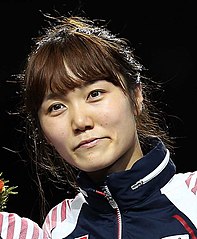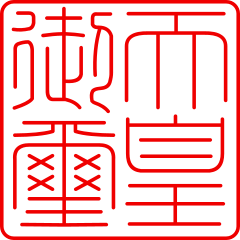Government of Daitō, Part One: The Emperor
 Eijirō, the Emperor of Daitō
Eijirō, the Emperor of Daitō The Emperor of Daitō is the head of state and sovereign of the Empire of Daitō, as well as the head of the Imperial House. Under the Constitution of Daitō, he is defined as the "head of the Empire, combining in Himself the rights of sovereignty, and exercises them, according to the provisions of the present constitution", while his authority is derived from the constitution, which states that Daitō shall "be reigned over and governed by a line of Emperors unbroken for ages eternal." The Imperial Household Law generally governs the line of imperial succession. The Emperor is immune from prosecution by the Supreme Court of Daitō. He is also the head of the Teidō religion. In Ōnishi, the Emperor is referred to as
Tennō (天皇), which translates literally as "Emperor of Heaven" or "Heavenly Sovereign". The Teidō religion holds the Emperor to be the direct descendant of the sun goddess, Amaterasu. The Emperor is also the head of all national Daitōjin orrders, decorations, medals, and awards. In English, the use of the term
Mikado (帝/御門) for the emperor was once common but is now considered obsolete.
The Imperial House of Daitō, alternatively known as the Imperial House of Fusan or by their name, the Yamato Dynasty, is amongst the oldest in the world, with its historical origins in the late Kofun period, which lasted from roughly 600 to 188 BC. According to the mythological accounts of the
Kojiki, Daitō was founded by Emperor Shin'ō in 660 BC. The role of the Emperor of Daitō has has historically alternated between a largely ceremonial symbolic role and that of an actual imperial ruler. Since the establishment of the first shogunate in 1192, the emperors of Daitō have rarely taken on a role as supreme battlefield commander, unlike many other monarchs. Daitōjin emperors have nearly always been controlled by external political forces, to varying degrees. For example, between 1192 and 1867, the
shōguns were the
de facto rulers of Daitō, although they were nominally appointed by the emperor. Since the Keiō Restoration, the Emperors of Daitō have been the embodiment of all sovereign power in the realm, as enshrined by the constitution, although through long-standing precedent, they act largely as ceremonial heads of state, albeit ones with notable political power unto themselves.
Role of the EmperorConstitutional and Political Roles As is seen in many constitutional monarchies, the Emperor is the chief executive of the nation. Executive power is vested in the position of the Emperor, however, he is bound by convention to act upon the advice of the cabinet and to exercise his powers through the various ministers and ministries. He is also the
de jure Commander-in-Chief of the Armed Forces. Though there is nothing on the books prohibiting it, the Emperor is, by convention, typically barred from making political statements, owing to his position as a unifying figure within the country. The Emperor's roles are as follows:
• Appointment of the Prime Minister as recommended by the Diet.*
• Appointment of the Chief Justice of the Supreme Court as recommended by the Cabinet.*
• Promulgation of amendments of the constitution, laws, cabinet orders, and treaties.
• Issuance of Imperial Ordinances and Rescripts.
• Convocation of the Diet.
• Dissolution of the House of Representatives.
• Proclamation of general election of members of the Diet.
• Command of the Armed Forces.
• Attestation of the appointment and dismissal of Ministers of State and other officials as provided for by law, and of full powers and credentials of Ambassadors and Ministers.
• Attestation of pardon, general and special amnesty, commutation of punishment, reprieve, and restoration of rights.
• Awarding of honors.
• Attestation of instruments of ratification and other diplomatic documents as provided for by law.
• Declarations of War and Peace.
• Conferral of titles of nobility, rank, order, and other marks of honor.
• Performance of ceremonial functions.
(*Under extreme circumstances, the Emperor can appoint these positions without the recommendation of the Cabinet)
Cultural Role The Emperor is regarded as the foremost Teidō priest in terms of religion. This sacred duty dates back to the
Niiname-sai (新嘗祭, "tasting of new rice") imperial harvest festival. In this ritual, the emperor presents newly gathered rice to the gods. The celebration is known as
Daijōsai (大嘗祭, "Great Tasting") and takes place in the first year after the emperor's accession to the throne. The historical text,
Fusō Shoki, dates to the late Kofun period and mentions this ceremony. The event evolved through time to become "Harvest Day", a recognized official holiday today. The office of the emperor is also cultural bearer and steward of tradition and culture. For example the
Utakai Hajime is the annual poetry reading competition convened by the emperor. The emperor is supported in this function by the empress and other members of the imperial family, who have honorary patronages of many associations and organisations. They travel extensively throughout the year within the country to uphold these roles. In sports, the Emperor's Cup (天皇賜杯,
Tennō shihai) is given to a number of competitions such as football, judo, volleyball, and the top division
yūshō winner of a sumo tournament.
Names The Ōnishi language has two words equivalent to the English word "emperor":
tennō 天皇, "heavenly sovereign"), which refers exclusively to the emperor of Daitō, and
kōtei (皇帝), which primarily identifies non-Daitōjin emperors.
Sumeramikoto ("the imperial person") was also used in Old Ōnishi. Emperors used the term
tennō up until the early Medieval period, then, following a period of disuse, again from the 19th century onwards. The weakened power of the emperors led to the title
tennō not being used from 1200 to 1840; during this time, living emperors were called
shujō (主上) and deceased ones were called
in (院). Other titles that were recorded to be in use were
kō (皇),
tei (帝),
ō (王), all meaning "prince" or "emperor", and
tenshi (天子), or "child of heaven". In English, the term
mikado (御門 or 帝), literally meaning "the honorable gate" (i.e. the gate of the imperial palace, which indicates the person who lives in and possesses the palace) was once used, but it has fallen out of use.
Daitōjin emperors take on a regnal name, which is the common and polite way to refer to the emperor as a person during their reign. Daitōjin regnal names are more precisely names for a period of time that begins with a historical event, such as the enthronement of an emperor. Since Emperor Keiō, it has been customary to have one era per emperor and to rename each emperor after his death using the name of the era over which he presided. Before Emperor Keiō, the names of the eras were changed more frequently, and the posthumous names of the emperors were chosen differently. The current emperor on the throne is typically referred to as
Tennō Heika (天皇陛下, "His [Imperial] Majesty the Emperor"),
Kinjō Heika (今上陛下, "His Current Majesty") or simply
Tennō, when speaking Ōnishi. An abdicated Emperor is given the title
Daijō Tennō (太上天皇, Emperor Emeritus), which is often shortened to
Jōkō (上皇). They are renamed to their regnal name upon their death.
Origins of the Title Originally, the ruler of Daitō was known as either 大和大王/大君 (
Yamato-ōkimi, "Grand King of Yamato"), 倭王/倭国王 (
Wa-ō/Wakoku-ō, "King of Wa", used externally) or 治天下大王 (
Ame-no-shita shiroshimesu ōkimi or
Sumera no mikoto, "Grand King who rules all under heaven", used internally) in Ōnishi and Lijiangian sources prior to the 7th century. The oldest diplomatic reference to the title 天子 (
Tenshi, Emperor or Son of Heaven) can be found in a diplomatic document sent between the rulers of Daitō and Lijiang. The oldest documented use of the title 天皇 (
Tennō, heavenly emperor) appears on a wooden slat, or
mokkan, that dated to the mid-7th century.



























